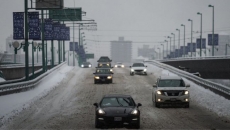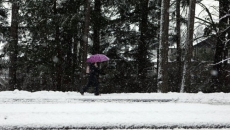The number of hazardous spills in British Columbia has trended upwards over the last several years, making it even more important for the government to prepare, auditor general Michael Pickup says.
His latest report released Tuesday says the Ministry of Environment is not effectively managing hazardous spills in the province, using a decade-old response plan and data that is not easily accessible.
"Whether it's fuel from a motor-vehicle incident or a leak from a sunken or grounded boat, thousands of spills are reported every year and the number has trended higher," Pickup said in a statement.
"When high-risk incidents happen, the ministry responds appropriately. But effective management is more than that."
Pickup's report shows 5,306 spills and other environmental emergencies were reported in the 2021-22 fiscal year, up from 4,436 in 2018-19. The most recent numbers for the 2022-23 fiscal year show 4,889 reports.
The report says the province's current provincial-level plans for responding to a major spill are about 10 years old.
Pickup told a news conference that risk levels, technology and the people involved in an emergency can all change over time.
He said there are thousands of spills each year, requiring a plan to be "evergreened" and "kept current."
The report makes nine recommendations, including that the province update its plans for major spills, and improve the effectiveness of its cost-recovery process.
Environment Minister George Heyman said in a statement that his office accepts all of Pickup's recommendations.
"The auditor general's recommendations reinforce the work we are doing to strengthen and improve our processes, and our engagement with the office of (the) auditor general is informing our work to develop a new environmental-emergency management action plan," he said.
"We will release this plan later this year."
The report says the government didn't consistently notify First Nations communities of hazardous spills, and millions of dollars owed to the province haven't been recovered from those responsible.
It says from April 2016 to February 2023, approximately $900,000 of spill-related costs were recovered, while about $13.9 million remains outstanding, almost entirely from the clean up in 2019 of the Neucel pulp mill site.
After the company in Port Alice on Vancouver Island went bankrupt in 2020 the government began legal action to recover costs.
"Two of the staff we interviewed told us the program lacks capacity for cost recovery. One explained that program staff responsible for this area don’t have the time or the financial expertise to perform this work," the report says.
The report says the ministry collects provincial-level data, including information on the status of spills by region, but the system was difficult to use and most staff required IT support to put the information into a usable format.
In response to Pickup's report, the ministry says it has launched a pilot program using a web-based software system to help inform First Nations of incidents and it is currently reviewing its cost recovery procedures.
It says the ministry will work with the software system provider to improve access to data about spills.
"Our upcoming action plan will ensure that hazardous spills are prevented, contained and remediated effectively, and that communities have a full and prompt understanding of any impacts to the health of their environment," Heyman said.






